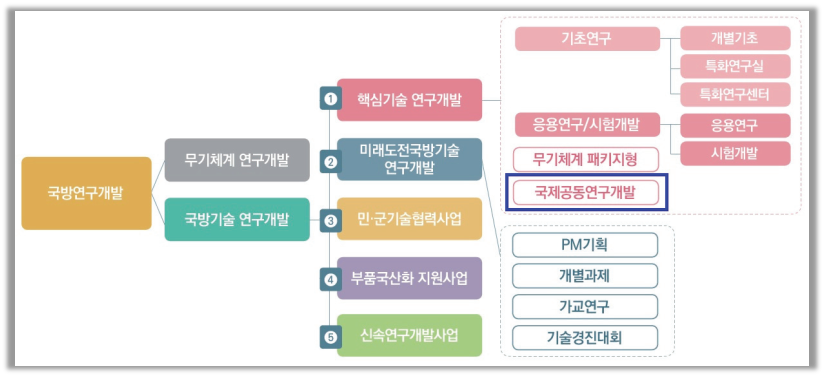Critical success factors of government-led international technological cooperation for national defense core-technology R&D projects
DOI:
https://doi.org/10.37944/jams.v6i1.173Keywords:
defense core technology, international technology cooperation, international joint research and development, project performanceAbstract
In the defense core technology field, it is important to secure core technologies at a pace that is in line with the pace of technological development, which has become more advanced over time. However, the pace of technological advancement is faster than ever, and the need for weapons systems with new technologies is increasing. Nevertheless, it can be said that independently securing core technologies in all fields is almost impossible, considering the required costs and duration. International technology cooperation can overcome these cost and period constraints, and strengthen relations between countries. International technology cooperation in the field of defense core technology has began to overcome difficulties in independent development; however, the sharing and joint development of key defense-related technologies among countries has encountered various difficulties. Therefore, in this study, the factors affecting the performance (quantitative and qualitative) of core technology R&D projects in the defense sector were divided into individual competencies (professional skills, communication skills, leadership, and foreign language skills) and external factors (legal system, interrelationship, cost reduction, and period reduction), and research models and hypotheses were established. This hypothesis was verified through a survey and a multiple regression analysis. The analysis revealed that the derived influencing factors had a positive (+) effect on project performance, confirming that both individual competency and external factors are important in project performance.
Metrics
References
Cho, M. K. (2015). A Study on the Effect of the Personal Competence to the National R&D Project Management and Performance. [Doctoral dissertation, Hanyang University]
Choi, C. H., You, Y. Y. (2017). The Study on the comparative analysis of EFA and CFA. Journal of Digital Convergence, 15(10), 103-111. https://doi.org/10.14400/JDC.2017.15.10.103
Choi, J. Y. (2008). Female Scientists` Expertise Development: Individual & Environmental Factors. The Korean Journal of Woman Psychology, 13(2), 153-176. I410-ECN-0102-2009-180-009152295
Eum, J. S. (2013). An Empirical Study on the Defence R&D Project Risk Factors Analysis. [Doctoral dissertation, Ajou University]
Hwang, S. H. (2015). A Study on the Effect of Defense R&D Project Risk Factors on Project Performance. [Doctoral dissertation, Soongsil University]
Hyun, Y. J. (2017). National Cultural Dimensions and their Impact on Quality Management Maturity and Project Quality Performance: Focusing on ITER Project. [Doctoral dissertation, Sungkyunkwan University]
Kafouros, M., Love, J. H., Ganotakis, P., & Konara, P. (2020). Experience in R&D collaborations, innovative performance and the moderating effect of different dimensions of absorptive capacity. Technological Forecasting and Social Change, 150, 119757. https://doi.org/10.1016/j.techfore.2019.119757
Kil, E. S. (2017). The influence of global IS project manager’s knowledge and agility on project success: focusing on emotional support. [Doctoral dissertation, Ewha Womans University]
Kim, D. I. (2010). A Study on the Effects of Research Organizations’ Level of International Joint R&D Cooperation on R&D Performance. [Doctoral dissertation, Konkuk University]
Kim, S. B. (2020). The Fourth Industrial Revolution and High-Tech Defence Industrial Competition: Transformation of World Politics from the Theoretical Perspective of Emerging Powers. Korean Journal of International Relations, 60(2), 87-131. https://doi.org/10.14731/kjir.2020.06.60.2.87
Kim, S. H. (2019). A Study on the Impact of Entrepreneurship, Manager Competency, and Risk Management on Project Performance of the Project Manager. [Doctoral dissertation, SeoKyeong University]
Ko, H. S. (2010). Study one the success model of international projects on the Innovetive nuclear Energy System. [Doctoral dissertation, Chungnam National University]
Lee, D. H. (2016). A study on the influence of defense acquisition specialities on project performance. [Doctoral dissertation, Kwangwoon University]
Lee, H. J., & Chung, S. Y. (2013). What Drives International Technology Cooperation?: Joint R&D Cooperation in Defense Core Technology. JOURNAL OF TECHNOLOGY INNOVATION, 21(2), 355-373. G704-001004.2013.21.2.008
Lee, H. J., & Chung, S. Y. (2014). Study on the Strategies for Promoting Defense International Technology Cooperation: Based on the Korean and Indian Defense Joint Technology Cooperation. Journal of Korea Technology Innovation Society, 17(3), 584-603. G704-001043.2014.17.3.008
Lee, S. B. (2017). The Effects of Project Manager’s Leadership Competence on Project Performance. [Doctoral dissertation, Hanyang University]
Lee, S. J. (2016). Developing a Competency Model for International Education Development Cooperation Expert. [Doctoral dissertation, Pusan National University]
Oh, H. S., Bae, J. H., Sung, E. M., Bae, H. J. (2012). A Study on The Relationship between Expertise and Research Performance of Scientists : Towards Faculties and Graduate Students of Universities. The Journal of Vocational Education Research, 31(1), 75-94. G704-000975.2012.31.1.012
Oh, H. S., Sung, E. M., Bae, J. H., & Sung, M. J. (2009). A Comparative Study of the Main Characteristics Between the Top Experts from General Experts in Company Context. Asian journal of education, 10(4), 105-135. https://doi.org/10.15753/aje.2009.10.4.005
Oh, J. B. (2006). R&D Collaboration: An Empirical Study on the Government Sponsored R&D Program. The Korean Journal of Industrial Organization, 14(3), 111-146. I410-ECN-0102-2009-320-000867155
Podgórska, M. and Pichlak, M. (2019). “Analysis of project managers’ leadership competencies: Project success relation: what are the competencies of polish project leaders?”. International Journal of Managing Projects in Business, 12(4), 869-887. https://doi.org/10.1108/IJMPB-08-2018-0149
Sánchez-Sellero, P., & Bataineh, M. J. (2022). How R&D cooperation, R&D expenditures, public funds and R&D intensity affect green innovation?. Technology Analysis & Strategic Management, 34(9), 1095-1108. https://doi.org/10.1080/09537325.2021.1947490

Downloads
Published
How to Cite
Issue
Section
License
Copyright (c) 2023 Journal of Advances in Military Studies

This work is licensed under a Creative Commons Attribution 4.0 International License.

This work is licensed under a Creative Commons Attribution 4.0 International License.

이 저작물은 크리에이티브 커먼즈 저작자표시 4.0 국제 라이선스에 따라 이용할 수 있습니다.






